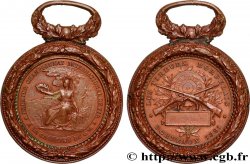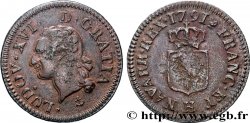fme_1083467 - III REPUBLIC Médaille, Philippe d’Orléans, frappe médaille module de 10 centimes
2.00 €
Количество
Добавить в корзину

Тип Médaille, Philippe d’Orléans, frappe médaille module de 10 centimes
Дата: 1900
Металл: brass
Диаметр: 30 mm
Ориентация осей монеты: 12 h.
Вес: 7,78 g.
Век: lisse
Пуансон: sans poinçon
Комментарии о состоянии
Patine hétérogène avec une forte usure, notamment sur les hauts reliefs. Traces de coups, rayures et taches d’oxydation
Лицевая сторона
Аверс: легенда: PHILIPPE DUC D’ORLÉANS 1900.
Аверс: описание: Son buste de trois-quarts à gauche.
Обратная сторона
Реверс: легенда: JE NE VENGERAI QUE LES INJURES FAITES Â LA NATION * PHILIPPE * / SUR HUIT LIGNES : JE / REPLACERAI / MON PAYS / AU PREMIER RANG / DES NATIONS / AVEC LE CONCOURS / DE TOUS LES VRAIS / FRANÇAIS.
Реверс: Описание: Légende circulaire et en 8 lignes.
Комментарий
Il existe une autre version très proche datée 1900 et une autre variée et datée de 1909 avec la formule Tout ce qui est national est nôtre.
Philippe, duc d'Orléans est surtout resté dans l'Histoire pour être retourné en France, en 1890, bravant ainsi les lois d'exil qui, depuis 1886, en tenaient la famille royale éloignée. Arrêté après s'être présenté au bureau de recrutement de Paris pour faire son service militaire (ce qui lui valut le surnom de "prince gamelle"), il fut condamné à deux années d'emprisonnement et expulsé. Prétendant au trône de France depuis la mort de son père, en 1894, il vécut l'essentiel de sa vie en Angleterre. Marié en 1896 à l'archiduchesse Marie-Dorothée d'Autriche, il mourut sans descendance en 1926. Ses droits dynastiques passèrent alors à son cousin Jean, duc de Guise, père du Prince Henri d'Orléans (biographie extraite de http://www.musee-orsay.fr/fr/evenements/expositions/archives/presentation-generale/browse/12/article/photographies-de-philippe-duc-dorleans-4189.html?tx_ttnews[backPid]=252&cHash=70b983c279 ).
There is another very similar version dated 1900 and another varied one dated 1909 with the formula Everything that is national is ours. Philippe, Duke of Orléans, is remembered above all for having returned to France in 1890, thus defying the exile laws which, since 1886, had kept the royal family away. Arrested after presenting himself at the Paris recruitment office to do his military service (which earned him the nickname \\\"Prince Gamelle\\\"), he was sentenced to two years of imprisonment and expelled. A pretender to the throne of France since the death of his father in 1894, he lived most of his life in England. Married in 1896 to Archduchess Marie-Dorothée of Austria, he died without descendants in 1926. His dynastic rights then passed to his cousin Jean, Duke of Guise, father of Prince Henri of Orléans (biography taken from http://www.musee-orsay.fr/fr/evenements/expositions/archives/presentation-generale/browse/12/article/photographies-de-philippe-duc-dorleans-4189.html?tx_ttnews[backPid]=252&cHash=70b983c279 )
Philippe, duc d'Orléans est surtout resté dans l'Histoire pour être retourné en France, en 1890, bravant ainsi les lois d'exil qui, depuis 1886, en tenaient la famille royale éloignée. Arrêté après s'être présenté au bureau de recrutement de Paris pour faire son service militaire (ce qui lui valut le surnom de "prince gamelle"), il fut condamné à deux années d'emprisonnement et expulsé. Prétendant au trône de France depuis la mort de son père, en 1894, il vécut l'essentiel de sa vie en Angleterre. Marié en 1896 à l'archiduchesse Marie-Dorothée d'Autriche, il mourut sans descendance en 1926. Ses droits dynastiques passèrent alors à son cousin Jean, duc de Guise, père du Prince Henri d'Orléans (biographie extraite de http://www.musee-orsay.fr/fr/evenements/expositions/archives/presentation-generale/browse/12/article/photographies-de-philippe-duc-dorleans-4189.html?tx_ttnews[backPid]=252&cHash=70b983c279 ).
There is another very similar version dated 1900 and another varied one dated 1909 with the formula Everything that is national is ours. Philippe, Duke of Orléans, is remembered above all for having returned to France in 1890, thus defying the exile laws which, since 1886, had kept the royal family away. Arrested after presenting himself at the Paris recruitment office to do his military service (which earned him the nickname \\\"Prince Gamelle\\\"), he was sentenced to two years of imprisonment and expelled. A pretender to the throne of France since the death of his father in 1894, he lived most of his life in England. Married in 1896 to Archduchess Marie-Dorothée of Austria, he died without descendants in 1926. His dynastic rights then passed to his cousin Jean, Duke of Guise, father of Prince Henri of Orléans (biography taken from http://www.musee-orsay.fr/fr/evenements/expositions/archives/presentation-generale/browse/12/article/photographies-de-philippe-duc-dorleans-4189.html?tx_ttnews[backPid]=252&cHash=70b983c279 )








 Cообщить об ошибке
Cообщить об ошибке Распечатать страницу
Распечатать страницу Отправить мой выбор
Отправить мой выбор Задать вопрос
Задать вопрос Consign / sell
Consign / sell
 Информация
Информация











